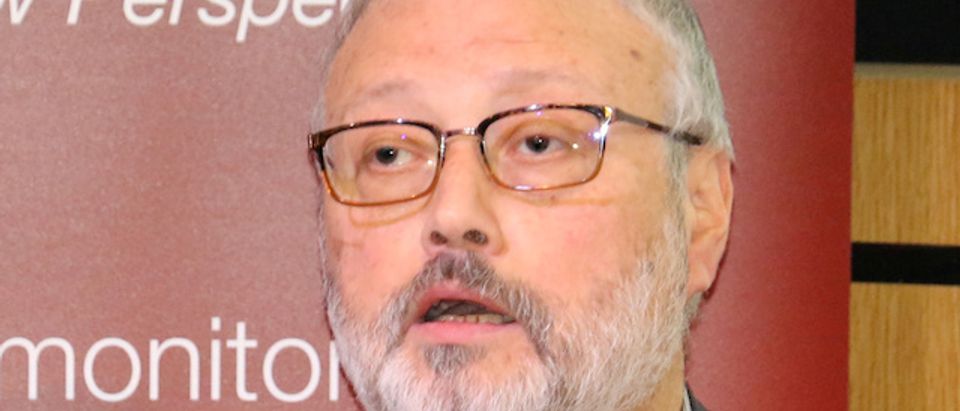Critics lambaste President Trump for failing to blame influential Saudi Crown Prince Mohammad bin Salman for Jamal Khashoggi’s killing and react more aggressively, even though Khashoggi was not an American citizen and the crime was not committed in a U.S. jurisdiction.
While Trump has already criticized the Saudis harshly in public and private, sent Secretary of State Mike Pompeo to confront the Saudis, and sanctioned seventeen Saudi officials, some in Congress want him to go father and stop arms sales to Riyadh or demand it stop fighting Iranian-backed forces attempting to take over neighboring Yemen.
What Congress could do instead is put the murder of Khashoggi in perspective and shed light on why he was killed. Better information would help the American public understand why Trump, whose first constitutional priority is defending America from foreign threats, has chosen to react firmly but not impetuously.
Ignorance abounds. The Washington Post, for which Khashoggi wrote opinion pieces since 2017, has been in a state of hysteria since his killing, running several articles about the matter each day, most of which blame Trump in one way or another.
It’s important to understand who Khashoggi really was and the motive for his murder, especially if we are being asked to turn our back on an important ally as a result. While the Washington Post and progressive media have tried to paint him as an earnest journalist who merely criticized Saudi policy, and Wikipedia describes him as “a liberal progressive,” that is not the full story.
Khashoggi started his career as a journalist, eventually working for a series of Saudi-backed media outlets. Khashoggi was seen favorably by the Saudi government and rewarded, becoming a player in their media and political ecosystem. But eventually the relationship soured and Khashoggi came to support those who would overthrow the Saudi government along with other governments in the Middle East. While at the Washington Post, he advocated for the Muslim Brotherhood, writing an article entitled, “The U.S. is wrong about the Muslim Brotherhood — and the Arab world is suffering for it.” One line from the article: “There can be no political reform and democracy in any Arab country without accepting that political Islam is a part of it.”
Put simply, Khashoggi had become an Islamist — a supporter of the political movement that wants to combine mosque and state and create Iranian-style theocracies around the Middle East. There’s nothing particularly “liberal” or “progressive” about that.
At the same time, he came to work for a Washington Post that was transforming from a dusty left-wing newspaper trading on bygone glory days to a well-funded vehicle for political activism. Amazon founder Jeff Bezos bought the paper in 2013 and began providing it with ample resources and digital prowess. And then Donald Trump happened. It caused the Washington Post to dispense with any sense of journalistic impartiality. Sift through its articles on any given day, and you’ll understand why no one has heard much from the Democratic National Committee in recent years: the Washington Post does its job for it.
Ironically, Bezos himself is not a left-winger. Those who have worked with him over the years describe him as a libertarian, and he has given to both Democratic and Republican politicians. The Washington Post is actually his protection against the left-wing mob. They will mostly forgive him for running a monopoly, putting main street out of business, and being stingy with worker pay as long as his flagship media property supports the left.
But this confluence of factors has led the Washington Post to become more and more activist. Every day, the paper drips with hatred of Trump from beginning to end. And its willingness to throw caution to the wind apparently extends to international operations.
Notably, the Washington Post put out Khashoggi’s pieces not only in English, but Arabic as well. This is odd since the paper has almost no Arabic content. One could argue they began waging political warfare on behalf of the Muslim Brotherhood.
Khashoggi’s articles targeting the Saudi government reportedly reached a big audience. And that was the rub for those who would eventually kill him: he wasn’t just another Islamist opponent of the Saudis; he had been one of their operatives, had fed at their table, broke with them, and then had been given a powerful platform and brand to challenge them politically from the heart of Washington. Of course none of this justified their actions, but the risk should have been understood by the Washington Post.
If the paper had still been focused on journalism instead of relentless, impassioned political warfare against the Trump administration and its more controversial foreign partners, would they have hired an Islamist like Khashoggi and given him such a powerful tool to effect vengeance on his former employer?
Regardless of the answer, no one should be treated as Khashoggi was. But a president must consider the security of 330 million Americans and not react based on emotion or moral preening by Congress and the media. If we want to live in a world where Iran and other Islamists don’t win, we should support President Trump’s tough but measured response to Saudi Arabia and his desire to maintain a crucial alliance.
Christian Whiton was a State Department senior adviser in the Donald J. Trump and George W. Bush administrations. He is the author of “Smart Power: Between Diplomacy and War.”
The views and opinions expressed in this commentary are those of the author and do not reflect the official position of The Daily Caller.


